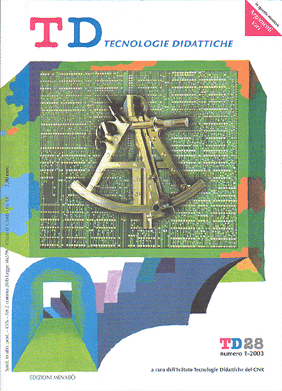Browsing the WWW at school: what’s the point?
Main Article Content
Abstract
Article Details
Section
Authors who publish with this journal agree to the following terms:
- Authors retain copyright and grant the journal right of first publication with the work simultaneously licensed under a Creative Commons CC BY 4.0 Attribution 4.0 International License.
- Authors are able to enter into separate, additional contractual arrangements for the non-exclusive distribution of the journal's published version of the work (e.g., post it to an institutional repository or publish it in a book), with an acknowledgement of its initial publication in this journal.
- Authors are permitted and encouraged to post their work online (e.g., in institutional repositories or on their website) prior to and during the submission process, as it can lead to productive exchanges, as well as earlier and greater citation of published work (See The Effect of Open Access)
References
Burbules N. C. (1997), Aporia: Webs, Passages, Getting Lost, and Learning to Go On, Philosophy of Education YearBook 97 http://www.ed.uiuc.edu/EPS/PESyearbook/ 97_docs/burbules.html
Caviglia F. (2002), Lie Detecting as a Step Towards Critical Literacy, L1- Educational Studies in Language and Literature Vol. 2, n. 3, 179- 220.
Chapman D. W. (1999), A Luddite in Cyberland, Or How to Avoid Being Snared by the Web, Computers and Composition n.16, 247- 252.
Cunningham D.J., Arici A., Schreiber J., Lee K. (2001), Navigating the Wirld Wide Web: the role of abductive reasoning, CRLT Technical Report n. 19-01, Indiana University.
Dodge B. (1997), Some Thoughts About WebQuests, e-paper http:// edweb.sdsu.edu /courses/edtec596/ about_webquests.html
Eisenberg M.B., Johnson D. (2002), The Big6 Learning and Teaching Information Technology Computer Skills in Context, Eric Digest, EDOIR- 2002-04.
Gadamer H.G. (1983), Verità e Metodo, Bompiani.
Hölscher C., Strube G. (2000), Web search behavior of Internet experts and newbies Computer Networks 33, 337–346.
Jakes D. S., Pennington M. E., Knodle H. A. (2002), Using Internet to promote inquiry based learning, e-paper http://www.biopoint.com /inquiry/ibr.html
Janssen T. (2001), Self-questioning in the literature classroom: a review of research. Graduate Institute of Teaching and Learning, University of Amsterdam.
Lazonder A. W. (2001), Minimalist Instruction for Learning to Search the World Wide Web, Education and Information Technologies 6:3, 161- 176.
Lucca G. (2003), Didattica Del Latino e Strumenti Informatici , Atti di Didamatica 2003, in stampa.
McKenzie B.(1998), Grazing the net, Now On The Educational Technology Journal http://www.fno. org/text/grazing.html
Navarro-Prieto R, Scaife M., Rogers Y, (1999), Cognitive Strategies In Web Searching, Proceedings V Conference on Human Factors& the Web http://zing.ncsl.nist.gov/hfweb/p roceedings/ navarro-prieto/
Petrucco C. (2001), Costruire mappe per cercare in rete: il metodo Sewcom in TD n. 1, pp 37-48.
Salomon G. (1998), Novel Constructivistic learning environment and novel technologies: some issues to be concerned with Research Dialogue in Learning and Instruction Vol 1 n. 1 pp 3-12.
Novel Suarez, J., Martin A. (2001), Internet Plagiarism: A teacher’s combat guide. Contemporary Issues in Technology and Teacher Education, Online Serial http://www.citejournal.org/vol1/ iss4/currentpractice/article2.htm
Van der Meij H. (1994), Student questioning: a componential analysis. Learning and individual Differences 6(2) 137-161.
Weinrich H. (1985), Vie della Cultura Linguistica, Il Mulino.
Weintgartner C. Postman N. (1975), L’insegnamento come attività sovversiva, La Nuova Italia.
Wilson B., Lowry M. (2001), Constructivist Learning on the Web, in Liz Burge (Ed.), Learning Technologies: Reflective and Strategic Thinking. Jossey-Bass, San Francisco http://ceo.cudenver.edu/~brent_ wilson/WebLearning.html

